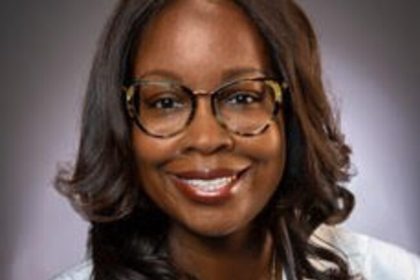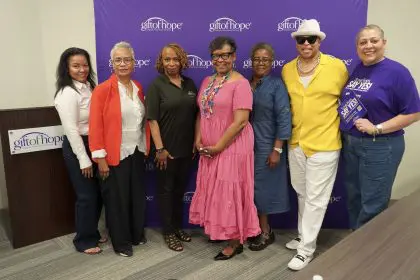
In a health landscape where Black women face maternal mortality rates three to four times higher than their white counterparts, Dr. Shantesica Gilliam is pioneering an innovative educational approach at Spelman College that empowers the next generation of health advocates. As an Assistant Professor in the Environmental and Health Sciences Department and founder of the SUPERNOVA Research Lab, Dr. Gilliam has created a first-of-its-kind course that places students at the center of curriculum development while addressing one of the most pressing health inequities facing Black women today.
The triple University of Georgia alumna brings her background in Health Promotion and Behavior to bridge the gap between academic research and community needs, creating pathways for students to become leaders in advancing maternal health equity.
What prompted your interest in maternal mortality and how did it become central to your work at Spelman?
Maternal mortality, the rates that we hear now about Black women being three to four times more likely to die from childbirth compared to White women, that statistic isn’t new, but there is now a lot of media coverage around it. I didn’t have anyone in my family who died from childbirth, but I did have people in my family who suffered from childbirth complications and also some pregnancy issues. And because of that, that is what prompted my interest in the area to do some research around maternal and child health.
When I came to Spelman about two years ago, I was telling my students, “Hi, I’m Dr. Gilliam. I am interested in this type of work, maternal child health, maternal mental health, the whole reproductive process in general,” and my students were like, “Wait, we know a little bit about it, but we don’t know too much about it.” And as I started to immerse myself in the classroom, in the research setting and building out my research at Spelman College, my students began to cultivate an interest in this work.
Some of them already came to Spelman interested because they heard of these statistics, but our students at Spelman feel that there’s some type of social responsibility in the things that they do. Our tagline at Spelman is “A Choice to Change the World,” and they hold that heavy to their heart. They feel like what happens to one Black woman happens to another, and they really want to make a difference.
Why is research led by Black women so crucial for our community?
I like to see it as a way to tell stories to the academic community. It’s a way for us to bring about voice for people who are in our communities and people who are impacted by these health issues to the academic community, things feel a little siloed. So we have our community, we have our people who are out working in the community. So our nonprofits community based organizations. And then we have our academic institutions, our researchers, our teachers, our medical providers, and sometimes things feel silo.
It doesn’t feel like we’re all together, and so one of my goals is to bridge that gap between community and academia. It’s very important for, number one, Black women to conduct research and be the face of research, so that we can instill some type of trust into our communities. A lot of people do not trust research due to the historical injustices that we’ve seen specifically with the Tuskegee syphilis experiment. And so a lot of people when they hear research, they’re like, “Oh, they’re scary.”
With our faces being within the community and also doing research, it is still some type of trust into the community. And also helps us gather that data and those stories that we can relate back to our other academic institutions and partners, so that they can know what can be priority when it comes to funding research, when it comes to funding communities, and then also how we can communicate our findings also to each other in the community.
Tell us about the innovative approach you’ve created at Spelman to address maternal mortality.
At Spelman College, we are, I would say, uniquely positioned to cultivate leaders because we are a Black women’s college, historically, Black Women’s College, because these leaders can understand the science behind maternal and child health. They can also understand the lived experience of marginalized communities, and so at Spelman College we created a course, and the first of its kind, it is called Foundations of Maternal and Child Health: Prioritizing the Black Body.
What made this a bit unique is No. 1, it’s the first course of its kind at Spelman, and it is designed to introduce students to maternal child health through the lens of health equity, advocacy, and also community engagement. Another thing that makes this unique is that this course was created in collaboration with our students.
Our students had a voice on what they wanted to learn, we had a community dialogue. We had students come in, eat some pizza and talk to us about what they wanted to see in this course, and then they also took some surveys. We incentivized them, we gave them gift cards for coming out and lending their voices to us, and from there I selected five teaching assistants — Chelsea Tamara Benton, Michelle Washington, Naya Bournes, Talia Ford and Jaisha Williams. These students are health science students, comparative women study students, political science. So, this just shows, like the broad interest of our students. We have students who were math majors come and say they had an interest in maternal and child health, computer science majors, so there is a need for this.
Our students created this course, they did the syllabus. We have a book club, they picked out the book “Killing the Black Body” by Dorothy Roberts. They picked out the readings, they created the assessments. The students had a hand in every single piece of the process of creating the course, and with that they were able to have some type of agency over their education, and to know that they can also have a say in what they want to learn.
At a time where we know that Black maternal mortality is this national crisis. It is critical that our students, who are future public health leaders, politicians, clinicians, are prepared to be able to address these issues and also be able to say that they had a say in that preparation.
How does it feel to be empowering future generations to improve health outcomes in our community?
It’s so empowering! It’s fulfilling. I always tell my students that they’re the reason why I keep going every single day. If there’s a time where I just feel like I’m not motivated, where things are feeling too heavy. We know that there is an attack on public health right now, which also means that there will be an attack on maternal child health, and the initiatives around that. Things do feel just a bit heavy and a bit scary, but I think about my students, and I can’t.
There’s also times where I just want to not look at things or to remove myself, but I can’t do that because I have these students who I have to show up for, every single day, it’s just empowering to be able to empower them.














